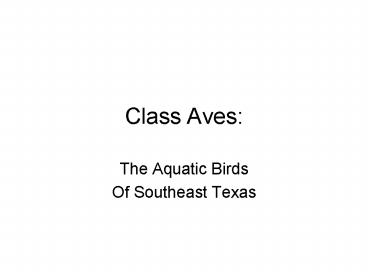Class Aves:
1 / 19
Title: Class Aves:
1
Class Aves
- The Aquatic Birds
- Of Southeast Texas
2
What makes a bird AQUATIC?
- Beak structure
- Foot structure
- Leg length
- Neck length
3
A spearlike beak indicates a fish diet!
Snowy Egret
Long legs indicate a stalking method of hunting.
Common Egret
4
Great Blue Heron
Yellow-crowned Night-heron
Green Heron
5
Anhinga
More fish-eaters, but short legs indicate a
swimmer!
Double-crested Cormorant
6
Common Merganser
Common Loon
7
Short neck and legs, no webbed feet, but
spearlike beak how does this bird fish? A by
diving
Belted Kingfisher
8
The chickenlike beak alllows these birds to eat
plant material.
Pied-billed Grebe
American Coot
Common Moorhen
9
The Sora another chickenlike aquatic bird.
10
The gulls and killdeers beaks allow for
general purpose feeding, while the sandpipers
bill makes an excellent probe.
Ringed-billed Gull
Spotted Sandpiper
Killdeer
11
Long legs allow ibis and storks to wade, but with
narrower decurved beaks, they feed on
invertebrates.
White Ibis
12
Northern Pintail
Northern Shoveler
Hooded Merganser
Scooped bill makes an excellent strainer
for plants, invertebrates, even small fish!
Ducks!
Black-bellied Whistling-Duck
Webbed feet and short, powerful legs for
effective swimming
Mallard
Wood Duck
Blue-winged Teal
13
A Crayfishs nightmare Hawks by day, Owls by
night
Red-shouldered Hawk
Barred Owl
14
Strong talons and heavy beaks allow these raptors
to prey on fish!
Bald Eagle
Osprey
15
Swallows are often seen by water because their
wide gapes and fluid flight make them supreme
insectivores!
Purple Martin
Barn Swallow
16
Warblers and wrens also hunt for insects, using
their needle-like beaks to probe amongst the
foliage.
Marsh Wren
Common Yellowthroat
17
Male
Female
The triangular beak of the Red-winged Blackbird,
signifies an all omnivorous diet of insects,
fruits, and seeds.
18
Avian Aquatics Assignment
- Avian Construction
- With your partner, draw OR make a model of TWO
imaginary aquatic birds one plant eater, one
fish eater - then describe in a brief paragraph
the features you have included the make it
suitable for an aquatic lifestyle. - DUE tomorrow Friday, 3 December, at beginning
of period.
19
- Place the birds in this presentation in their
proper order. Then find the family of each.
Construct a cladogram with this information. - Order Gaviiformes
- Order Anseriformes
- Order Coraciiformes
- Order Strigiformes
- Order Gruiformes
- Order Ciconiiformes
- Order Passeriformes
- http//www.earthlife.net/birds/orders.html































